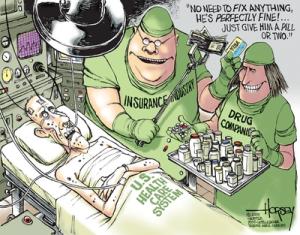- MENU
- HOME
- SEARCH
- WORLD
- MAIN
- AFRICA
- ASIA
- BALKANS
- EUROPE
- LATIN AMERICA
- MIDDLE EAST
- United Kingdom
- United States
- Argentina
- Australia
- Austria
- Benelux
- Brazil
- Canada
- China
- France
- Germany
- Greece
- Hungary
- India
- Indonesia
- Ireland
- Israel
- Italy
- Japan
- Korea
- Mexico
- New Zealand
- Pakistan
- Philippines
- Poland
- Russia
- South Africa
- Spain
- Taiwan
- Turkey
- USA
- BUSINESS
- WEALTH
- STOCKS
- TECH
- HEALTH
- LIFESTYLE
- ENTERTAINMENT
- SPORTS
- RSS
- iHaveNet.com
by Robyn Blumner

This is a problem-solving moment for government.
President Barack Obama and the Democratically-led Congress are rolling up their sleeves, sharpening pencils and trying to deliver health-care changes that cover many more people, provide a safety net for the rest of us and won't bankrupt our nation the way the current system most assuredly will.
Meanwhile, with little to offer beyond raspberries from the sidelines, Republicans have consigned themselves to the spoiler role.
Their answer to the health-care crisis gripping this country (and the answer of a handful of insurance-industry-beholden Senate Democrats) is to throw themselves bodily in the way of a public option in order to protect the rapacious profits of the private health insurance industry.
But what we have learned about free-market health insurance is that even when one can get an individual policy, it is often like having no insurance at all.
A standard in the industry is to look for ways to reap premiums, then skip out on promised benefits. This is what the status-quo Republicans are fighting to retain.
A public option is a necessity because it is the only way to temper the demonstrable amorality of private insurers. If companies have to compete with a government plan that doesn't treat customers like they are a gambler's easy marks, the companies will have to reform or wither.
Rescission is when a person with individual health insurance has their coverage yanked just as they get sick. This industry practice is known as "post-claims underwriting" and is widespread even where there are laws against it, such as in California.
Among its many victims is registered nurse Robin Beaton, 59, who told a subcommittee of the House Energy and Commerce Committee this month of her ordeal at the hands of Blue Cross Blue Shield.
After she was diagnosed with an aggressive form of breast cancer, the company canceled her policy. Beaton says that the company "took my high premiums," but once she filed a cancer claim, they searched "high and low" for a reason to rescind her policy.
Blue Cross found a notation written on her dermatologist's chart that seemed to indicate something precancerous.
It didn't matter that her dermatologist called the insurer to say it was just acne. Beaton also had inaccurately recorded her weight in applying for coverage and failed to mention that in the past her heart would beat fast when she was upset. She said that Blue Cross noted these lapses as possible bases for rescission.
A double mastectomy scheduled to save Beaton's life was postponed until she could find other insurance or pay for the operation herself -- an impossibility on both counts.
Beaton said it took direct intervention by her congressman to get Blue Cross to reinstate her policy.
Insurance companies employ people who do nothing but search through a customer's medical history once an expensive claim is filed, looking for misrepresentations or discrepancies, even unintentional ones, in the insured's application.
According to the committee's investigation, at least 19,776 policies were rescinded between 2003 and 2007 by the three insurance companies that testified at the hearing -- WellPoint Inc., Assurant Health and UnitedHealth Group.
The moves saved them at least $300 million.
Policies are canceled for failing to disclose information even when a patient didn't know what a doctor had written on their medical chart. Rescissions occur even if an omission is unrelated to the policyholder's current ailment.
Assurant automatically initiates an investigation into the policyholder's medical history if a claim is made for one of 2,000 diagnosis codes. For WellPoint, it's 1,400.
When top executives of the three insurers were asked by subcommittee chairman Rep. Bart Stupak, D-Mich., if they would vow to limit rescissions to cases where there had been an intentional fraudulent misrepresentation, they all answered "no."
Dumping the sick is simply too good for business.
Private insurers are squealing about the possibility of a government option, but they brought this on themselves through their greed and predation.
We can't trust them to do what's right when we get sick. Now it's their turn to feel a little sick themselves.
WORLD | AFRICA | ASIA | EUROPE | LATIN AMERICA | MIDDLE EAST | UNITED STATES | ECONOMICS | EDUCATION | ENVIRONMENT | FOREIGN POLICY | POLITICS
Day of Reckoning at Hand for Health Insurers
If there were a Straight Talk Express for health economists, Princeton professor Uwe
Reinhardt would be the engineer. Born in Germany and raised in Canada, Professor Reinhardt has personally experienced medical systems in different
countries. Over the past 25 years, he has become a critical voice in the debate about reforming America's healthcare system